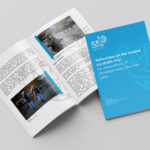This November marks one year since the end of the second Nagorno-Karabakh war. Since the signing of the trilateral agreement, which ended the hostilities in 2020, the pace of geopolitical change in the South Caucasus has been staggering. The post-war period initiated several major geopolitical trends and accentuated others which had been long emerging in the region.
The Changing Western Stance
First, the war highlighted a regression in Western peacekeeping standards. The Western approach to conflict resolution based on equality rather than geopolitical interests has been decidedly trumped by the Russian alternative. Moscow is suspected of not looking to resolve (it rarely, if ever, pursued peace efforts in other territorial conflicts) the Nagorno-Karabakh conflict. Instead, the Kremlin is seeking to freeze it under its close watch in an attempt to retain tools of influence over Armenia and increasingly Turkey-leaning Azerbaijan.
The West’s inability to play a proactive role toward fluid geopolitical circumstances in the South Caucasus also raises questions about its long-term commitment to engage the region and help resolve the separatist conflicts. The second Nagorno-Karabakh war was, in a way, an upshot of the West’s declining engagement in the region which started from 2010s, but accelerated in the past several years. The US has been looking elsewhere – the Indo-Pacific region is now a primary theater of activity with Washington. The EU has been hobbled by internal differences, and the fear of troubling already tense ties with Russia weigh significantly upon policymakers in Brussels.
Growing Western unwillingness to engage the region more extensively is also reflective of the troubles within the liberal order. In a way, the Russian peacemaking tradition and the West’s inadequate position in the South Caucasus tell crucial details of the changing the global system where such formats as the Minsk Group gradually lose relevance. Instead, the age of great power competition has returned to the region.
Indeed, Turkey and Russia’s recent push (together with Iran’s blessing) to create a six-nation pact bringing together the South Caucasus states, plus Russia, Turkey and Iran highlights the changes in the international system. The application of balance of power ideas is back in the game and the Eurasian trio is thus trying to build a new order, which I called elsewhere as the hierarchical order. Iran, Russia, and Turkey will try to build a closed regional cooperation model from the Black Sea to the Caspian basin. If implemented, the West will be absent from this arrangement and the tools of leverage it still holds could be further eroded.
Yet another critical change which followed the 2020 war is that the collective West can no longer treat the South Caucasus as a monolithic entity. Rather, a diversified foreign policy should be applied reflecting the existing realities on the ground. The EU, for instance, should be more geopolitical in its approach to adjust to the ever-more fractured nature of the South Caucasus.
The lack of Western resolve in the region and the Black Sea could propel the local, small, and geopolitically weak actors toward diversifying their foreign ties – one could call it a “rebalancing.” For instance, Georgia’s inability to ascend to the EU and NATO could be complemented with constructing closer ties with Eurasia’s emerging economic and geopolitical powers. This nuanced foreign policy change could be reflective of similar processes which take place in Ukraine and even Turkey, both of which are seeking closer ties with China.
The war also solidified that the Caspian basin and South Caucasus are inextricably linked to the greater Middle East. Russia and Turkey are basing their strategies in the region on developments in the Middle East and the Black Sea region. Not since the end of the Soviet Union has the South Caucasus been such a critical point for the powers around it. In a way, this re-emergence of close contacts between the South Caucasus and the Middle East is a return to normalcy which was disrupted in early 19th century by Russian annexation of the South Caucasus. Indeed, in pure geographic terms the region is better connected to Turkey and Iran than to Russia with which it shares an impassable Caucasus range.
Iran Battling to Retain its Role
It is true that Iran was never a dominant power in the South Caucasus. Unlike Russia or Turkey, the traditional power brokers, it has not had a true ally. Iran was certainly part of the calculus for states in the region, but it was not feared, like Ankara or Moscow. And yet, the South Caucasus represents an area of key influence for Tehran, based on millennia of close political and cultural contacts various Persian empires had with the South Caucasus.
The second Nagorno-Karabakh war changed Iran’s calculus in the region. The results showed Tehran’s interests were unheeded, while Turkish influence grew exponentially. Thus, Iran now has to adjust to the radically changed geopolitical landscape. Perhaps its recent escalation with Azerbaijan betrays the Islamic Republic’s concerns about its weakening position in the South Caucasus.
Yet there is little Iran can realistically do to meaningfully boost its position in the region. The South Caucasus will certainly feature higher in Tehran’s foreign policy agenda than before. Perhaps closer cooperation with Russia will also follow as both countries loath growing Turkish influence. Iran can also support Armenia in its efforts to contain the triumphant Azerbaijan.
Strategic changes on the ground bring about the necessity in Tehran to adopt a different foreign policy outlook. A more robust foreign policy toward the South Caucasus would nevertheless require greater financial and military attention to the region – resources a cash-stripped and sanctioned Islamic Republic lacks.
Armenia’s Unfavorable Position
The period since the end of the war also highlighted the undercutting of democratic ideals and achievements of the region’s democratic states. Take Armenia: its young democracy had high hopes following the 2018 revolution, but now it will be even more dependent on Russia, which augurs badly for an aspiring liberal democracy.
With incompatibility between an aspiring democracy with a powerful illiberal country such as Russia, the Armenian leadership will now have to make extensive concessions to Moscow to shore up its military, backtracking on its democratic values. Building a fair political system cannot go hand in hand with the Russian political model.
The war also put an end to any real hopes of Armenia implementing a multi-vector foreign policy. Even prior to 2020, Armenia’s multiaxial foreign policy efforts gradually deteriorated, with the 2016 fighting showing the limits. Armenian politicians attempted to develop ties with other regional powers, but Russian influence had begun to increase.
The 2020 war obliterated Yerevan’s multiaxial policy efforts for years to come. Now, Armenia’s dependence on Russia will be even more pronounced with no viable geopolitical alternatives. With no practical foreign policy diversification options, the three South Caucasus states are now further divided by larger regional powers, accelerating the fracturing of the region.
Looking Ahead
Much of how the things will shape up in the future around the South Caucasus will depend on Iran, Russia, and Turkey, but how the US approaches the region will be no less crucial. The collective West will have to come to a certain understanding with Turkey, even if it be limited, to salvage its deteriorating position in the region. After all, the South Caucasus has always been the only theater where Turkish and Western interests have always coincided.
Delay in reconsideration of the US policy could spell disaster for remaining Western influence in the South Caucasus. Georgia, which serves for the West as a door to the Caspian basin and on to Central Asia, could be the biggest loser if Washington shifts its foreign policy away from the region. A deeper engagement in economic and security cooperation is preferable, which would be an effective tool for preventing an alternative, Russian model of dominating the region.
Along with Georgia, Armenia and Azerbaijan too will face the lack of foreign policy options if the West’s unwillingness to commit to the region continues to grow. The reality could be the closing off of the region, the development of a 3+3 platform, decline of democratic principles, and the eventual spread of illiberalism.
Emil Avdaliani is a professor at European University.

